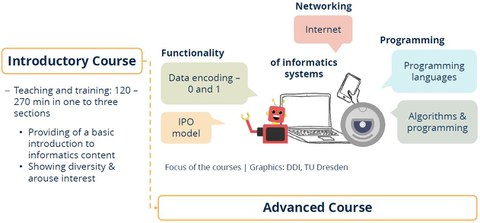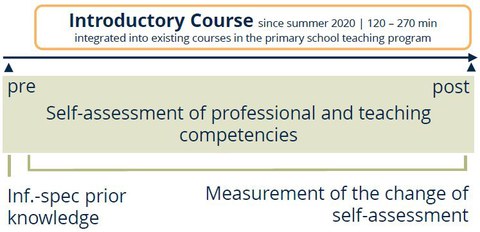Development of Informatics Competencies among Prospective Primary School Teachers
The world is permeated by informatics, even the youngest children encounter informatics systems and the respective phenomena. Consequently, even primary school children must acquire the necessary informatics competencies to act in this world in a self-determined manner (Gesellschaft für Informatik e. V. (GI), 2019). Therefore, primary school teachers must be able to work together with children on informatics content.
Table of contents
Aim and research questions
The aim of the dissertation is to investigate the impact of developed teaching-learning courses for building up informatics-specific professional and teaching competencies among (prospective) primary school teachers. For this purpose, instruments will be developed to measure these competencies as well as the participants’ self-assessment.
- Which informatics knowledge / competencies do (prospective) primary school teachers already have?
- How can (prospective) primary school teachers acquire informatics expertise within the framework of teaching-learning courses, so that:
- they can master them?
- they can teach them to children?
- they perceive themselves as having informatics-specific self-efficacy?
Teaching-learning offers
Based on the competency recommendations for the primary level of the Society of Informatics (Best et al., 2019), informatics-specific introductory and advanced courses were developed.

Overview of the informatics-specific teaching-learning offeris
Introductory courses (half a day) have been offered since the summer semester of 2020 with the aim of providing a basic introduction to informatics content, so that the diversity of informatics is demonstrated. The advanced course (one semester) has been offered since the summer semester of 2021, with a focus on teaching informatics content to primary school children. Participants develop their first informatics-specific lessons and test them together with their fellow students to gain initial experience in teaching informatics-specific competencies.
Orientation for course development
- Content: Recommendations of the German Informatics Society (Best et al., 2019); Informatics in primary schools in other countries (e.g. United Kingdom); Similar courses (Döbeli Honegger & Hielscher, 2017; Haselmeier, 2019)
- Material: e.g. Informatik an Grundschulen, IT2School
- Structure: Microteaching (only for advanced course, e.g. Höppner et al., 2019; Standl et al., 2020)
These courses are described in more detail on the following pages:
A wide range of informatics-specific materials are used in both courses. These are available in the open-access online course (German).
Research instruments
In order to investigate the impact of the developed courses for the development of informatics-specific professional and teaching competencies among (prospective) primary school teachers, instruments for the measurement of these competencies as well as the participants’ self-assessment were developed.
- Self-assessment items on informatics-specific professional and teaching competencies (as of 03/2022)
- Task items for the application of informatics-specific professional competencies
- Reflection sheet on informatics-specific lesson plans (as of 09/2022)
Use of the research instruments in the teaching-learning offers

Use of the research instruments in the context of the introductory course
- Both the introductory and advanced courses are examined using a pre-post test design for self-assessment of basic informatics competencies as well as teaching competencies on a 5-point Likert scale.

Structure of the advanced course including the use of the research instruments
- Within the advanced course, the informatics-specific lessons developed by the participants themselves and tested with their fellow students are assessed by all participants and a group of the Chair of Didactics of Computer Science using reflection sheets (version 1). The focus is on the didactic reduction, the fit to the target group and the action orientation. After the joint reflection, the participants revise their lesson plans (version 2). A group of the Chair of Didactics of Computer Science assess version 2. Versions 1 and 2 are compared in order to examine the teaching competencies.
- At the end of the advanced course, the acquired informatics competencies are assessed by individually solving informatics-specific tasks (automatically evaluable test items) closely related to the competencies facilitated in the course.
Current state
- In 2020, connecting points for the integration of informatics content and competencies in the Saxon primary school curricula (German) were identified.
- The application (pre and post) of the informatics-specific self-assessment items on competencies and teaching (German), in the context of an introductory course for primary school teacher education students in the winter semester of 2020/21, showed a significant increase in comparison to their self-assessment before their participation in the course.
- The analysis of the primary school curricula (core subjects + subjects with a technical focus) of the 16 German federal states shows that in eight out of 16 states informatics education is taught as a mandatory part of the primary school curriculum. The main content addressed is algorithms and programming as well as informatics systems, while the area of networks and the internet is addressed in only one federal state.
Publications
2023
-
Seminar zur informatischen Bildung in der Grundschule, 2023, 10. Fachtagung Hochschuldidaktik Informatik (HDI) 2023. Desel, J. & Opel, S. (eds.). FernUniversität in Hagen, p. 75-85, 11 p.Research output: Contribution to book/conference proceedings/anthology/report > Conference contribution
2022
-
Informatics Education in German Primary School Curricula, 25 Aug 2022, Informatics in Schools. A Step Beyond Digital Education - 15th International Conference on Informatics in Schools: Situation, Evolution, and Perspectives, ISSEP 2022, Proceedings. Bollin, A. & Futschek, G. (eds.). Cham: Springer, Berlin [u. a.], p. 3-14, 12 p.Electronic (full-text) versionResearch output: Contribution to book/conference proceedings/anthology/report > Conference contribution
-
Development of Informatics Competencies among (prospective) Primary School Teachers, 2022, ISSEP 2022: 15th international conference on informatics in schools. Local proceedings. Bollin, A. & Futschek, G. (eds.). Klagenfurt, Wien, p. 151-152, 2 p.Electronic (full-text) versionResearch output: Contribution to book/conference proceedings/anthology/report > Conference contribution
-
Grundschullehramtsstudierende erwerben Vermittlungskompetenzen für informatische Bildung, 2022, 1. Nachwuchs-Konferenz der Didaktik der Informatik (NaKoDi): Informatische Bildung überwindet Grenzen. Opel, S. & Losch, D. (eds.). Morschach, SchweizResearch output: Contribution to book/conference proceedings/anthology/report > Conference contribution
2021
-
Das I in MINT von Anfang an: Bildungsangebote zur informatischen Bildung der Stiftung „Haus der kleinen Forscher“, 2021, INFORMATIK 2021 - Die 51. Jahrestagung der Gesellschaft für Informatik: Computer Science and Sustainability. e.V. (GI), G. F. I. (ed.). Gesellschaft für Informatik, Bonn, p. 1649-1652, 4 p.Electronic (full-text) versionResearch output: Contribution to book/conference proceedings/anthology/report > Conference contribution
-
EduInf - Education in Informatics., 2021, p. 1645-1648Electronic (full-text) versionResearch output: Contribution to conferences > Paper
-
Weil informatische Bildung nicht erst in der Sekundarstufe beginnen darf: Integration informatischer Bildung ins Grundschullehramtsstudium, 2021, INFOS 2021 – 19. GI-Fachtagung Informatik und Schule. Humbert, L. (ed.). Gesellschaft für Informatik, Bonn, p. 103-112, 10 p.Electronic (full-text) versionResearch output: Contribution to book/conference proceedings/anthology/report > Conference contribution
2020
-
Anknüpfungspunkte zur Integration informatischer Inhalte und Kompetenzen in der Grundschule am Beispiel sächsischer Lehrpläne, 2020, Gemeinschaften in Neuen Medien. Von hybriden Realitäten zu hybriden Gemeinschaften.: 23. Workshop GeNeMe‘20 Gemeinschaften in Neuen Medien. Köhler, T., Schoop, E. & Kahnwald, N. (eds.).p. 370-376, 7 p.Electronic (full-text) versionResearch output: Contribution to book/conference proceedings/anthology/report > Conference contribution
-
Lehramtsstudierende mit Mikrofortbildungen aktiv auf den Beruf vorbereiten, 2020, Seamless Learning – lebenslanges, durchgängiges Lernen ermöglichen. Müller Werder, C. & Erlemann, J. (eds.). Waxmann Verlag GMBH, p. 159-163, 5 p.Electronic (full-text) versionResearch output: Contribution to book/conference proceedings/anthology/report > Conference contribution
-
Lehren und Lernen in der digitalen Welt – ein Lernangebot für zukünftige Lehrkräfte im Blended-Learning-Format, 2020, Seamless Learning – lebenslanges, durchgängiges Lernen ermöglichen. Müller Werder, C. & Erlemann, J. (eds.). Münster: Waxmann, p. 49-57, 9 p.Research output: Contribution to book/conference proceedings/anthology/report > Chapter in book/Anthology/Report